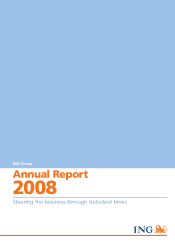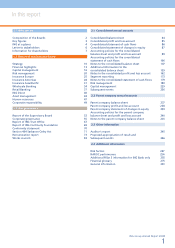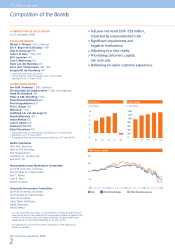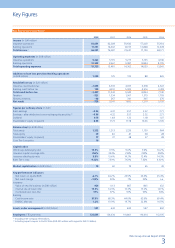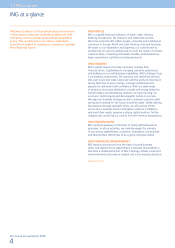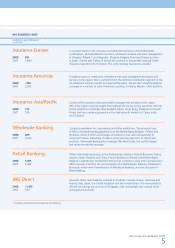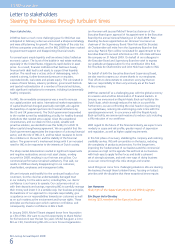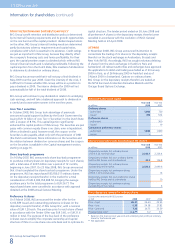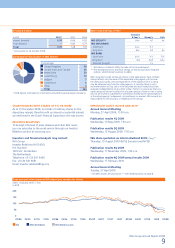ING Direct 2008 Annual Report Download - page 8
Download and view the complete annual report
Please find page 8 of the 2008 ING Direct annual report below. You can navigate through the pages in the report by either clicking on the pages listed below, or by using the keyword search tool below to find specific information within the annual report.
ING Group Annual Report 2008
6
1.1 Who we are
Letter to stakeholders
Steering the business through turbulent times
Dear stakeholder,
2008 has been a much more challenging year for ING than was
anticipated in February, when we announced a sharpened strategy
and were still planning for growth. The magnitude of the crisis has
left few companies untouched, and for ING 2008 has been marked
by government support and disappointing financial results.
For several years ample liquidity and low interest rates fuelled an
economic upturn. The burst of the bubble in real estate markets,
especially in the United States, triggered a rapid decline in asset
prices. As a result, financial institutions that had been heavily
financed with debt had to sell assets to support their liquidity
position. The result was a vicious circle of deleveraging, which
created a strong, further downward pressure on equities,
corporate bonds, real estate and private equity. This culminated in
a wave of bank failures, solvency problems, government bailouts
and (partial) nationalisation of a number of financial institutions,
with significant implications for everyone, including fundamentally
healthy companies.
For ING, the immediate consequence was a need to increase
our capital position and ratios. International market expectations
of capital levels had changed practically overnight, also against
the backdrop of capital injections into financial institutions by
the US and UK governments. The Dutch government responded
to the market turmoil by establishing a facility for healthy financial
institutions that needed extra capital. Given the exceptional
circumstances, and our desire to find a quick, sizeable and
proactive solution, we decided to use this facility for a EUR 10
billion capital strengthening agreement. We are grateful that the
Dutch government appreciates the importance of a strong financial
sector, and the role of ING in it, and has taken measures to boost
the confidence in the sector and the stability of the financial
system. The government’s involvement brings with it an increased
need for ING to be responsive to the interests of Dutch society.
The sharp market deterioration resulted in significant impairments
and negative revaluations across most asset classes, eroding
our profit in 2008, resulting in our first ever annual loss. Our
commercial performance remained satisfactory. That said, our
results in 2008 are clearly disappointing for our customers,
shareholders, employees and management alike.
We are fortunate and thankful for the continued loyalty of our
customers, but the crisis has understandably damaged trust
in our industry. For the entire sector, including ING, our clients’
confidence is our licence to operate. Our customers entrust us
with their deposits and savings, expecting ING to carefully manage
their money and invest it in a sensible way. Our business principles,
the backbone of our approach to corporate responsibility, give
us guidance on our responsibilities towards our customers as well
as on such matters as the environment and human rights. These
principles are the basis upon which customer confidence, and
consequently, investor confidence in ING is built.
In January 2009, Michel Tilmant stepped down from his position
as CEO of ING. We want to use this opportunity to thank Michel
for his hard work over the last five years. Michel has given a lot to
ING as CEO, transforming ING into a more focused organisation.
Jan Hommen will succeed Michel Tilmant as chairman of the
Executive Board upon approval of his appointment to the Executive
Board by the annual General Meeting on 27 April 2009. Peter
Elverding has been appointed as Jan Hommen’s successor as
chairman of the Supervisory Board. Wim Kok and Eric Bourdais
de Charbonnière will retire from the Supervisory Board on that
same day. Patrick Flynn will be nominated for appointment to the
Executive Board to succeed John Hele as CFO. John Hele will leave
the company on 31 March 2009. On behalf of our colleagues in
the Executive Board and Supervisory Board we wish to express
our gratitude and appreciation for the contribution Wim Kok,
Eric Bourdais de Charbonnière and John Hele have made to ING.
On behalf of both the Executive Board and Supervisory Board,
we also want to express our sincere thanks to our employees.
Their efforts to demonstrate to customers every day that we
take our responsibility to them very seriously are at the heart
of this company.
2009 has started off as a challenging year, with the global economy
in recession and a further deterioration of financial markets. In
January, we announced an Illiquid Assets Back-up Facility by the
Dutch State, which strongly reduces the risks in our portfolio.
Furthermore, we are confronting the crisis head-on by preserving
our capital base, reducing risk and bringing costs in line with the
operating environment. In concurrence with the Illiquid Assets
Back-up Facility, we announced measures to reduce costs including
a 6% reduction of our workforce.
With regard to the future of the financial industry, we expect more
modesty in scope and risk profile, greater impact of supervision
and regulation, as well as higher capital requirements.
In this first phase of recovery, stabilising the company and restoring
credibility are key. ING will concentrate on the basics, reducing
the complexity of products and services. For the longer term,
improving the fundamentals of our business and the commercial
processes are high on the agenda. We will look at our business
with fresh eyes to apply further focus and build a coherent
set of strong businesses, and seek new ways of doing business
so we can come through this crisis stronger and smarter.
Good things can come from challenging situations. We are steering
the business through these turbulent times, focusing on today’s
priorities with the discipline that these exceptional times require.
Jan Hommen
Chairman of the Supervisory Board and CEO designate
Eric Boyer de la Giroday
Acting CEO, member of the Executive Board

